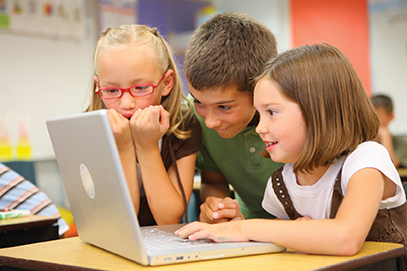Technology is changing the way children of today are interacting with the world.
In the article “In Classroom of Future, Stagnant Scores,” by Matt Richtel, the way seventh-graders in Chandler, Ariz. are studying Shakespeare has diverted from the traditional ways of learning Shakespeare. These students sit in clusters, bent over laptops or tablets engaging in different activities in relation to Shakespeare, like blogging from Shakespeare’s perspective or building Shakespeare a Facebook page.
In Potomac, Md., Stacey Roshan, an Advanced Placement calculus teacher at Bullis School, incorporates technology a little differently into the classroom. According to “Study: Emerging Technology Has Positive Impact in Classroom,” by Ryan Lytle, Roshan explains that she is facing the problem of trying to keep her students engaged during her lectures. To solve her problem, she created video lectures and assigned them as homework, like a reading assignment. The students come to class the next day with questions from the lectures and ready to work on practice problems.
“Technology is changing the way we do everything in the ‘real world,’” said junior high teacher Laurie Clausel. “For better or worse, society is becoming more tech-driven and education in general is slow to follow suit.”
The various uses of technology have been increasing over the years and children who have grown up in the digital age see it as their norm. According to some parents, technology is a double-edged sword. On one hand there are so many apps that teach young children math, science, reading and other important skills, but addictions could develop because of the excessive length of time some children spend mindlessly staring at a screen.
“I think (technology) will effect the future (of young people) because that will be the only kind of life they know,” said daycare director Kim Duffy. “Parents tend to use those objects as a babysitter.”
Addiction to iPads or other devices is on the rise among young children and has become a major concern. A recent case discussed in the Daily Mail shares that a four-year-old girl is Britain’s youngest iPad addict. Doctors report that when the device is taken away she experiences withdrawal symptoms.
Research detailed in the article “Children’s Immersion in Technology Is Shocking,” shows that the total amount of time young people are immersed in technology outside of school has increased. The time spent with technology now totals in at seven-and-a-half hours a day (without multitasking) to 10.75 hours a day (with multitasking). According to the latest Kaiser Foundation survey, television is the form of technology consumed the most by young people, totaling four hours and 29 minutes a day, outside of school. Computer use totals two hours and 31 minutes, video game use totals one hour and 13 minutes, reading totals 28 minutes and watching movies totals 25 minutes.
Many may wonder if excessive use of technology outside of school will affect progress in school. According to the same article written by Dr. Jim Taylor, 31 percent of children reported that they multitasked while doing their homework. Multitasking interferes with learning and the heavy use of technology while doing homework, 47 percent of students report fair to poor grades.
“If research has found that technology produces fair to poor grades, it’s because education hasn’t changed to meet the needs of a new society,” said Clausel. “Traditional methods won’t prepare kids for the digital age.”
As school and technology grow together, students and teachers must learn to adapt to the change because this world is becoming digital. Children, as young as kindergarteners, know how to operate a web browser better than they know how to tie their own shoes. They become absorbed in the gadgets and never learn how to interact with other children.
“One thing I have noticed is students not knowing how to play games as a group and take turns because they play games on their parents’ phones or iPads,” said kindergarten teacher Jackie Twait. “Kids don’t have the motor skills they use to because they tend to sit and play on the computers, iPads and video games instead of playing outside.”
The overuse of technology prevents young children from spending time with their parents, siblings and peers. They engage in electronic communication and hide behind glass screens where all they can see is their reflection.
“The thing that concerns me is how technology effects young children’s social skills,” said Twait. “I see that with my own grandchildren when we go out to eat, they feel like they need to be entertained (by a device) instead of talking with us.”
The “real world” and the digital world are coming together and schools and institutions are unprepared to accept this change.
The future of young children depends on technology.

